‘Mr. Malcolm’s List’ Director on Adapting the Regency Romance for the Modern Era: “We Can Make Our Own Rules”

For the ensemble of characters in Mr. Malcolm’s List, convention is a hurdle to love.
Written by Suzanne Allain and adapted from her book of the same name, the film stars Ṣọpẹ́ Dìrísù as Jeremy Malcolm, the season’s most eligible bachelor who is navigating the dating pool with a literal list of expectations for his future partner. When Zawe Ashton’s Julia Thistlewaite learns the list is why she’s failed to snag his heart, she recruits her cousin and Malcolm’s friend, Lord Cassidy (Oliver Jackson-Cohen), as well as her old friend Selina Dalton (played by Freida Pinto) and hatches a plan that will turn the tables on the man who made Julia the center of gossip during the season.
More from The Hollywood Reporter
Freida Pinto on Why 'Mr. Malcolm's List' Is a "Significant Step" for Inclusion On and Offscreen
'Mr. Malcolm's List' Team on the Magic and 7-Year Journey Behind Regency Rom-Com
Plans take an unexpected turn for Miss Thistlewaite with the arrival of the handsome Captain Henry Ossory (Theo James) and Selina, who discovers that as the unknowing Malcolm begins to fall for her, she may actually be falling for him, too.
Established conventions around gender, class and courting may threaten the main ensemble’s ability to find love, but Hollywood’s conventions posed a similar challenge for director Emma Holly Jones as she worked to get her debut feature, distributed by Bleecker Street and out in theaters on July 1, off the ground over seven years.
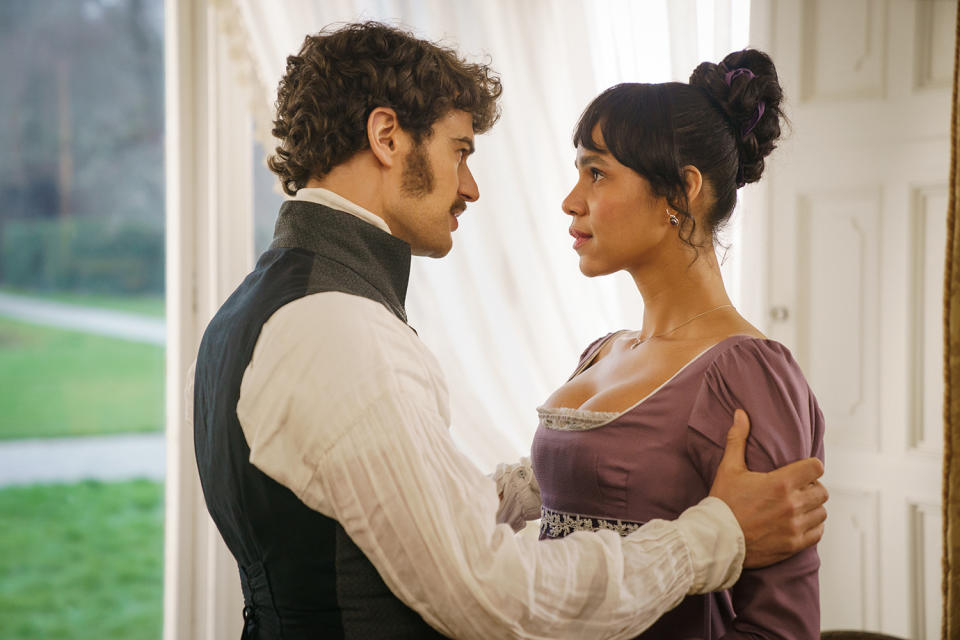
Courtesy of Bleecker Street
“It took a long time to get financed because a lot of people didn’t get what I was trying to do,” she said of the film’s journey to the screen. “I feel like Bleecker Street, specifically meeting Andrew Karpen and Kent Sanderson was one of the first conversations that I had where they could see what we were saying and what I was trying to pitch consistently time and time again: this is a large genre around the world that we have never made available for anyone else than English white people. Ever.”
Part of that wider vision for the genre was that her and Allains’ regency romance would be a mix of fantasy and “complete fan fiction,” instead of a standard period romance. That would give her and the team “permission to create our own world with it,” breaking from the historical conventions and expectations of the genre onscreen.
“I don’t think we created the world any differently to any other filmmakers, like creating a world in space or creating the world for The Northman because it isn’t Jane Austen. It isn’t Oscar Wilde. It is completely original characters and ideas,” she explains. “When people call into question historical accuracy to me — even with the short film where I was reading comments on the internet — hygiene would be a problem. People didn’t have fluoride back then, so most of them wouldn’t have their teeth.”
This is partly why Selina and Julia have a modern spin to their characterization. They’re women with bright, dynamic — if opposite — personalities who don’t always wait for a man’s permission and who are seen in locations like an 1818 horse auction, where women were historically not allowed.
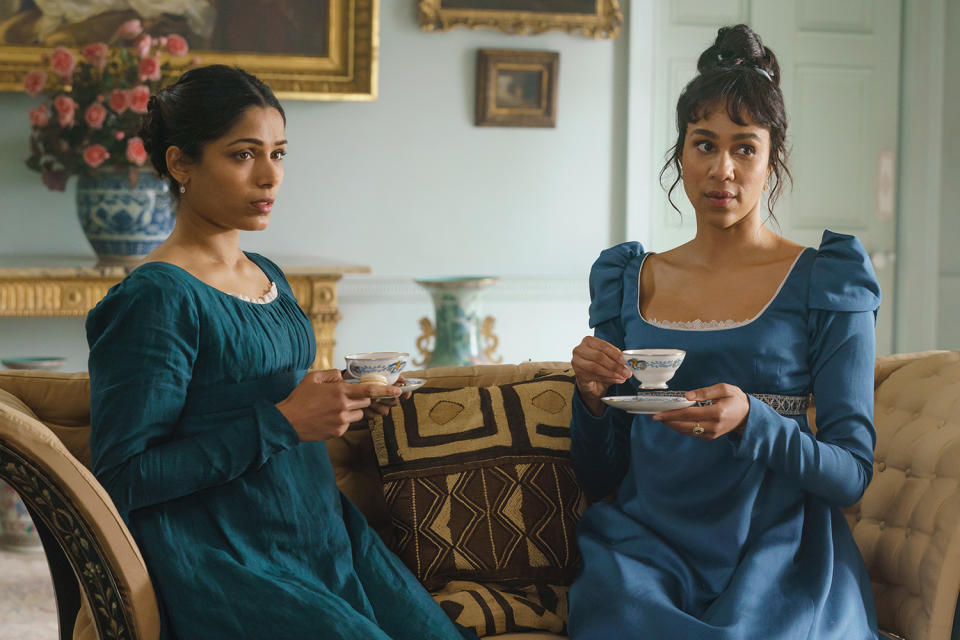
Courtesy of Bleecker Street
“[Mr. Malcolm’s List is] about women who maybe didn’t want to conform to the ideas and boundaries that society has put on them,” Jones explains. “So I wanted these women to reflect our society today and our audience today and, most importantly, I wanted to create a film that gave lots of young brown and Black girls around the world the ability to have their own Jane Austen film, whether it is Jane Austen or not. I think it’s awful that so many people just in the genre rom-com as a whole barely have movies, regardless of the time period.”
Jones also broke with convention on casting, delivering an ensemble mix of Black, Asian and white actors. Amma Asante’s Belle, Armando Iannucci’s The Personal History of David Copperfield, Carrie Cracknell’s upcoming Persuasion adaptation, alongside series like Bridgerton and Sanditon, have in recent years broken Hollywood tradition by casting more inclusively across race.
But none have featured two characters of color in the film’s leading and screen-time dominant romance. It’s a casting approach that can be credited to several things, among them Jones’ inner creative and personal circle, the musical Hamilton and the unconventional way she came to Allain’s book. The director’s first experience with the story came while listening to an episode of the Black List podcast in her car. Hearing it as a table read, she recalled, meant “my imagination could go wherever it wanted to go” with who the characters were.
In the same week, Jones saw Hamilton on Broadway in New York. “It completely challenged my preconception of what a period drama could be. Where it could go as a genre. I felt like of everything I had seen before, it started to put a lot into question,” she tells THR.
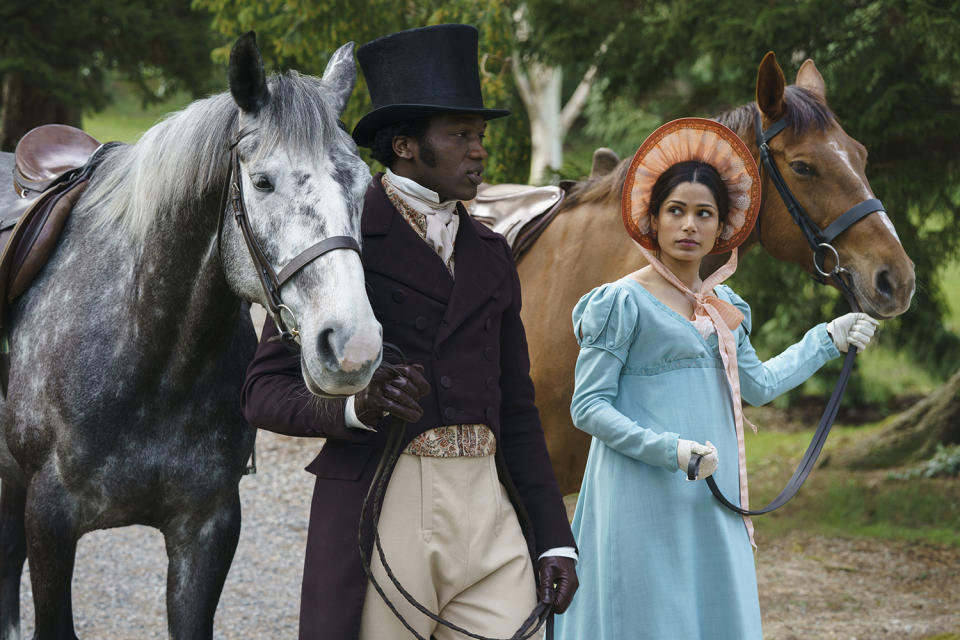
Courtesy of Bleecker Street
So she took the idea of “Mr. Malcolm’s List in the style of Hamilton” to Allain and her reps, winning the writer over. But it would still take her five years before she got the movie financed, a process complicated by the film being a more costly period piece from a first-time director and writer. In the meantime, she would work with Refinery29 to produce a 10-minute short film, released in 2019, as a concept pitch to show there was interest in the story she wanted to tell.
Limited production resources saw Jones turn to her inner circle, including fellow producer Laura Lewis, who suggested Pinto play Selina. Jones had also already known Jackson-Cohen and was close friends with Gemma Chan (featured in the short as Julia and replaced for the film by Ashton). As for her lead, Malcolm, the director turned to casting director Tamara-Lee Notcutt, who introduced the actor and director that eventually met on Skype.
“I remember texting the producers and the casting director within three minutes being like, ‘It’s him,'” Jones says of the instant feeling. “I, very much alongside the producers, was like ‘I make Mr. Malcolm’s List with Ṣọpẹ́ as Malcolm or I don’t make it because I’ve got nothing to lose here.’ To me, it was Freida and Ṣọpẹ́ and I never wavered on that.”
Jones admitted that unwavering commitment would slow the process of getting the film made as some financers considered whether the chosen actors, versus white talent, should lead the film. But the director says the movie’s producers, casting director and Allain were “so amazing at sticking with me on that.”
“Not all of those conversations, by the way, were solely about race either,” Jones adds. “A lot of people tried to tell me that I should be casting John Boyega instead. I was like, ‘Well, that’s nice, but I think it’s Ṣọpẹ́’ And nothing against John Boyega. I’m sure he would have done a lovely job, but Ṣọpẹ́ was my Malcolm.'”
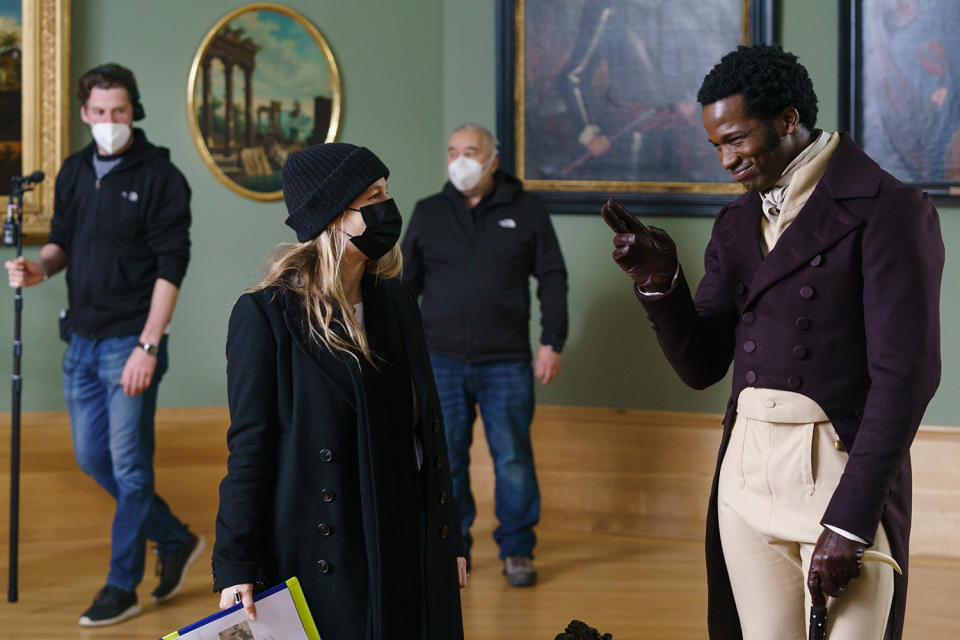
Courtesy of Bleecker Street
Jones leaned on the film’s talent and crew to help shape everything from character looks to the film’s settings. During the research phase, the director and the production team turned to, among other things, historians, 19th-century Indian and African artwork and furniture from different parts of the world to create color palettes, costumes and locations like Hadley Hall, that reflected both a “modern world” twist and the characters who inhabited them.
“I think that really big shocking thing to me — especially visiting the amount of art galleries I did and the amount of historians I spoke to — was just how much Hollywood had whitewashed, specifically, England’s past,” she says.
But with the help of designers like Eileen Buggy (hair) and Pam Downe (costume), as well as a cast that “could teach me a lot more than I knew off the top of my head,” hair and costume design landed on choices all involved “thought these people would have looked like back then, while also having a little bit of fun with it.”
The director notes that while other regency titles have opted to shave down the hair of their Black male characters, she “looked at multiple different afros with Ṣọpẹ́ and his hair designer” so he could feel comfortable as Mr. Malcolm. And when it came to Doña Croll, who plays Lady Kilbourne, Jones dismissed any notions of a wig in favor of dreadlocks.
“When Doña came in, I was like, ‘I just don’t want to put a wig on her.’ I love her hair. So it was how do we turn Doña’s hair into period hair?'” Jones recalls. “If I had just shoved a wig on her it would have looked like I shoved a wig on her.”
Leaning into her ensemble would come into play in other ways — specifically when an actress who had been cast to replace Gemma Chan dropped out “literally 10 days before we started shooting,” Jones recalled. In swept Ashton, whose performance Jones says not only “changed the dynamic of the film,” but — along with fellow Asian actress Naoko Mori — helped shape one of the film’s familial relationships.
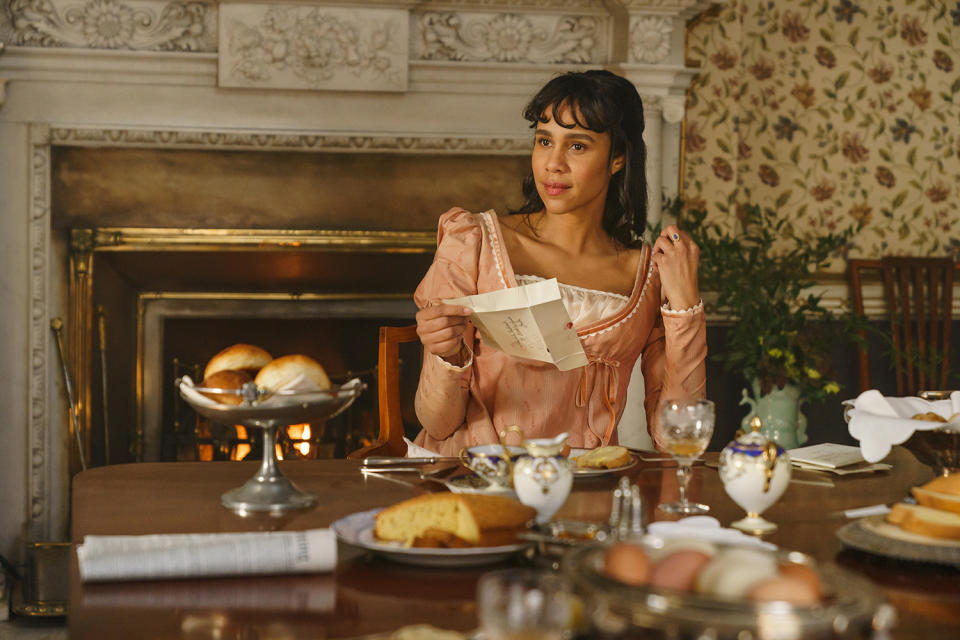
Courtesy of Bleecker Street
With Ashton, a mixed-race Black actress stepping in, Mori’s job may have been in danger among some who find the idea of a blended family logically challenging. But Jones said Mori was already in Ireland with her, and that another actor’s spear in the production shouldn’t ultimately affect whether Mori kept the role she won. “I wasn’t willing to take this wonderful woman’s job away from her, especially because I can make my own rules with this. We can make our own rules,” Jones says.
The trio would ultimately discuss how the Thistlewaite family might exist onscreen. One option was to envision Mr. Thistlewaite, who is not seen in the movie, as a Black man, making Julia mixed-race. But another option, the director says, was to “just look at it in the way in which we all kind of came to an agreement: it is our world, it is our rules, it is fantasy and it’s all about the right person for the job.”
That firm insistence both in the narrative and offscreen to simply not adhere to established convention led to a different kind of conversation between the director and star Jackson-Cohen. Jones tells THR that her steady desire to make her world inclusive raised questions within her and the actor about the romantic realities of his character, a single man in the season not seeking a wife.
It opened the door for them to wonder whether the character, seemingly straight in another narrative, would be in this one. Jones said she “couldn’t find the right storyline for it” in the material in front of her, so “we decided we don’t need to put a label on it” and she left it up to Jackson-Cohen’s character decisions. “But we have joked about sequels potentially for Lord Cassidy,” the director says.
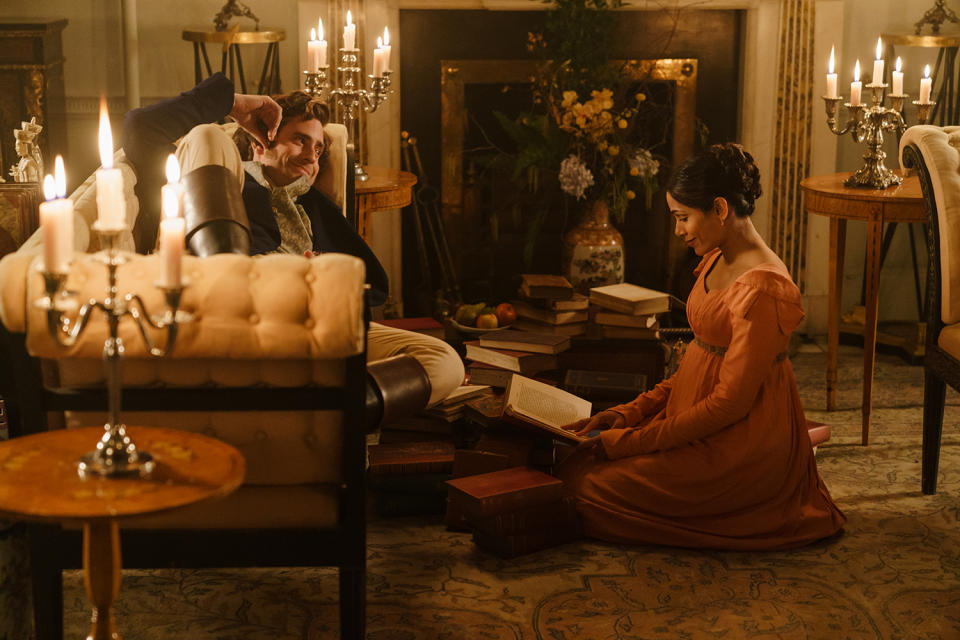
Courtesy of Bleecker Street
Throughout the entire process of making her debut film, Jones says she’s been repeatedly confronted with the bounds of her own imagination and challenged to think bigger as a filmmaker. “I started to realize I hadn’t been taught, I hadn’t noticed, I hadn’t opened my eyes. I hadn’t seen,” she tells THR, recalling her own educational journey. “I had to sit there and go to myself, ‘What did they teach me at school? What did I read? What did I know?'”
That means the director is also aware there still may be places representationally her film falls short, but that in itself motivates her to continue on among those “who are challenging all these things.”
“I might not have got everything right but as I always say to myself, I have two options: to do it the way I will do it or the way they’ve always done it. Which is better?” she adds. “It’s better to try, isn’t it?”
Mr. Malcolm’s List releases in theaters on July 1.
Best of The Hollywood Reporter

